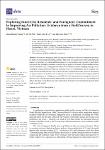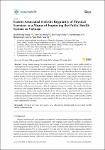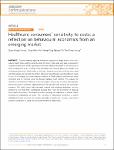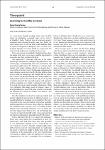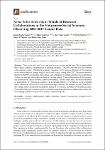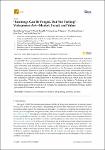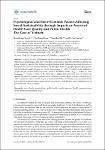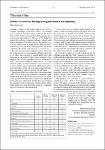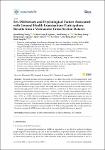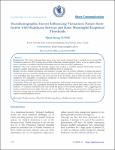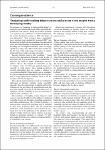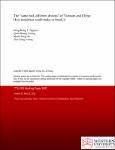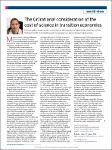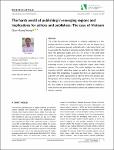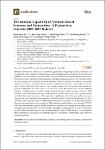Browsing by Author Quan-Hoang Vuong
Showing results [18 - 37] / 39
Solutions for mitigating and reducing environmental pollution are important priorities for many developed and developing countries. This study was conducted to better understand the degree to which inner-city citizens and foreigners perceive air pollution and respond to it, particularly how much they willingly contribute to improving air quality in Vietnam, a lower-middle-income nation in Southeast Asia. During mid-December 2019, a stratified random sampling technique and a contingent valuation method (CVM) were employed to survey 199 inhabitants and 75 foreigners who reside and travel within the inner-city of Hanoi. The data comprises four major groups of information on: (1) percepti... |
Retraction notices (RNs) are historical documents and must be as informative as possible to ensure the scholarly record is complete. |
Although studies have explored the predictors of book reading interest among children, little is known about the underlying mechanism that helps children become interested in reading books. This study attempt to demonstrate: (1) how book-reading interest is driven by reasons for choosing books (recommendation or personal preference), (2) how students with high and low academic achievements are motivated by different thinking pathways, and (3) how home scholarly culture improves book-reading interest through such pathways. Using Bayesian analysis on a dataset of survey responses from 4966 Vietnamese secondary students (11–15 years old, sixth to ninth grade), we found: (i) Reading inter... |
Although most Asian states are signatories to UNCLOS, which offers options for dispute resolution by either voluntary or compulsory processes, in reality fewer than a dozen Asian states have taken advantage of such an approach. The decision to adopt third-party mechanisms comes under great scrutiny and deliberation, not least because of the entailing legal procedures and the politically sensitive nature of disputes. Vietnam claims the second-largest maritime area in the South China Sea dispute after China. A comparison of two recent cases—the arbitration between the Philippines and China and the conciliation between Timor-Leste and Australia—highlights the importance of selecting betw... |
Background: This short communication report some new results obtained from a medical survey among 900 Vietnamese patients in 2015, looking into possibly influential sociodemographic factors as far as patient satisfaction is concerned, to establish empirical relationships between them for policy implications.
Methods: The study employed the baseline category logit models to establish empirical relationships between predictor variables and responses, which reflect different levels of satisfaction.
Results: Income, medical expenditure, and insurance coverage have the positive influence on improving patient satisfaction. However, insurance reimbursement rate has the negative influen... |
Vietnam–China relations could be captured in the Chinese expression ‘同床异梦’, ‘same bed, different dreams’. Analysing Vietnam–China’s asymmetric relationship, cultural and political similarities, divergences in global ambition and the involvement of foreign powers, this study shows how the relationship is increasingly interdependent but is equally fragile. One possible cause is the low level of trust on both sides, evidenced by repeated calls to ‘consolidate political trust’ or ‘enhance mutual trust’ in their high-level bilateral dialogues. |
International collaboration contributes significantly to improving scientific performance in Vietnam, but it also results in Vietnamese researchers depending on foreign partners to get their work published. The current study is an initial effort to examine the domestic research capability of Vietnam’s Social Science and Humanities (SSH) disciplines through scientific productivity. The research focuses on investigating various aspects, including leading Vietnamese authors, solo authors, and gender difference, as well as international and domestic collaboration networks. The study extracts the data of 2040 Vietnamese SSH authors, 1981 foreign authors, and 3160 publications during the pe... |
Logically, and by most common standards, academics would be pleased to be cited, considering it a form of recognition of their intellect. In return, especially those with high citation counts, such as Clarivate Analytics’ Highly Cited Researchers, can benefit through peer recognition, rewards, funding, securing a better position, or expanding a collaborative network. Despite known and untold benefits, one issue has not been discussed: the right to refuse to be cited or the right to refuse a citation. Academics might not want to be cited by papers published in truly predatory journals, papers with false authors, or sting papers with falsified elements that employ underhanded ethical ta... |
This short article represents the first attempt to define a new core cultural value that will enable engaging the business sector in humankind’s mission to heal nature. First, I start with defining the problem of the current business culture and the extant thinking on how to solve environmental problems, which I called “the eco-deficit culture.” Then, I present a solution to this problem by formulating the “semiconducting principle” of monetary and environmental values exchange, which I believe can generate “an eco-surplus business culture.” This work adds one new element, the eleventh cultural value, to the ten core values of progressive cultures postulated by Harrison (2000). |

